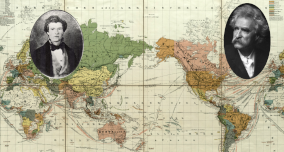Seattle's location, harbor, and commercial development made it a logical place for the Great Northern's terminus, and Hill had the good sense to engage the persuasive and influential Thomas Burke as his local agent. Having previously achieved the creation of Railroad Avenue, Burke had little difficulty persuading the city council -- over the vociferous objections of the Northern Pacific -- to give the Great Northern a 60-foot right-of-way down the middle of the wood-planked roadway.
The Great Northern reached Seattle in 1893, and by 1895 there were four transcontinental rail lines jostling for position on the waterfront. Seattle finally had its continental connections and a rapidly burgeoning international trade. Japan's Nippon Yusen Kaisha shipping line contracted with the Great Northern in 1896 to begin regular steamship service between Seattle and Japan. Hill soon launched his own ocean liners, the Minnesota and the Dakota, which carried passengers and goods from Smith Cove to China, Japan, and the Philippines.
https://www.historylink.org/File/1003
Seattle has a history of boom-and-bust cycles, like many other cities near areas of extensive natural and mineral resources. Seattle has risen several times economically, then gone into precipitous decline, but it has typically used those periods to rebuild solid infrastructure. The first such boom, covering the early years of the city, rode on the lumber industry. During this period the road now known as Yesler Way won the nickname "Skid Road", supposedly after the timber skidding down the hill to Henry Yesler's sawmill. The later dereliction of the area may be a possible origin for the term which later entered the wider American lexicon as Skid Row. Like much of the American West, Seattle saw numerous conflicts between labor and management, as well as ethnic tensions that culminated in the anti-Chinese riots of 1885–1886. This violence originated with unemployed whites who were determined to drive the Chinese from Seattle. In 1900, Asians were 4.2% of the population. Authorities declared martial law and federal troops arrived to put down the disorder.
Seattle achieved sufficient economic success that when the Great Seattle Fire of 1889 destroyed the central business district, a far grander city-center rapidly emerged in its place. Finance company Washington Mutual, for example, was founded in the immediate wake of the fire. However, the Panic of 1893 hit Seattle hard.
https://en.wikipedia.org/wiki/Seattle
